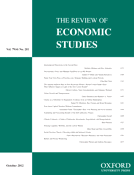
REVIEW OF ECONOMIC STUDIES
Scope & Guideline
Shaping Economic Discourse with Empirical Insights
Introduction
Aims and Scopes
- Economic Theory Development:
The journal focuses on advancing economic theories, providing a platform for innovative theoretical frameworks that enhance understanding of economic phenomena. - Empirical Economic Analysis:
It publishes empirical studies that utilize rigorous methodologies to investigate economic issues, ensuring that findings are robust and applicable to real-world scenarios. - Interdisciplinary Approaches:
RES embraces interdisciplinary research, incorporating insights from fields such as psychology, sociology, and political science to enrich economic analysis. - Policy Implications:
The journal emphasizes research with significant policy implications, aiming to influence economic policy through evidence-based insights. - Behavioral Economics:
A growing focus on behavioral economics is evident, with studies exploring how psychological factors influence economic decision-making.
Trending and Emerging
- Digital Economics and Technology:
There is a marked increase in research exploring the impacts of digital technologies and online platforms on economic behavior and market dynamics. - Inequality and Distributional Effects:
Studies examining inequality, particularly in the context of wealth distribution and labor markets, are gaining prominence, highlighting socio-economic disparities. - Environmental Economics:
Research focusing on climate change, sustainability, and the economic implications of environmental policies is trending, reflecting global concerns about ecological impacts. - Behavioral Insights in Economics:
An increasing number of papers are integrating behavioral insights into economic models, examining how cognitive biases and social influences affect decision-making. - Health Economics and Public Policy:
Research addressing the intersections of health, economics, and public policy is emerging, particularly in light of recent global health challenges.
Declining or Waning
- Traditional Macroeconomic Models:
There is a noticeable decline in the prevalence of traditional macroeconomic models that do not incorporate behavioral factors or real-world complexities. - Purely Theoretical Papers:
Papers that focus solely on abstract theoretical constructs without empirical validation are becoming less common, as the journal shifts towards more applied research. - Static Economic Analysis:
Static analyses that fail to account for dynamic changes in economic systems are increasingly being overshadowed by dynamic models that better capture real-time economic fluctuations. - Single-Dimensional Economic Policies:
Research focusing on narrow economic policies without considering broader social or political contexts is waning, indicating a trend towards more holistic approaches.
Similar Journals
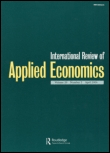
International Review of Applied Economics
Empowering Decision-Makers with Rigorous AnalysisInternational Review of Applied Economics is a leading journal dedicated to the dissemination of innovative research in the fields of economics and econometrics. Published by Routledge Journals, a renowned name in academic publishing under Taylor & Francis Ltd., this journal has established itself as a key resource for scholars, practitioners, and decision-makers. With an impressive Q2 ranking in the category of Economics and Econometrics, and positioned in the 70th percentile based on Scopus rankings, it provides a platform for high-quality, peer-reviewed articles that address contemporary economic issues. The journal aims to facilitate the understanding of applied economic theory and practice, and it accepts a diverse range of contributions including empirical studies, theoretical analyses, and methodological advancements. Operating from the United Kingdom, it has been a significant contributor to the academic dialogue since its inception in 1987, fostering knowledge exchange through rigorous scholarship. Researchers, professionals, and students alike will find valuable insights that inform policy-making and economic strategy in its pages.

Empirical Economics
Advancing empirical insights for impactful economic policy.Empirical Economics, published by PHYSICA-VERLAG GMBH & CO in Germany, is an esteemed journal in the field of economics that has been disseminating high-quality research since its inception in 1976. With an impressive convergence of studies that extends to 2024, the journal occupies notable positions within various academic categories, achieving a Q2 ranking in Economics and Econometrics and Statistics and Probability, and a commendable Q1 ranking in Mathematics (miscellaneous) and Social Sciences (miscellaneous) as of 2023. The journal stands out for its interdisciplinary approach, evidenced by its Scopus ranks that place it in the top percentiles across multiple sections, including the 86th percentile in both Mathematics and Social Sciences rankings. While currently not an open access journal, Empirical Economics serves as a pivotal platform for researchers, professionals, and academics seeking to engage with empirical methodologies that drive contemporary economic analysis and policy formulation. Its commitment to disseminating significant findings in the rapidly evolving landscape of empirical economic research makes it a must-read for anyone interested in the interplay between data and economic theory.

American Economic Review-Insights
Exploring contemporary issues with scholarly precision.American Economic Review-Insights, published by the American Economic Association, is a leading journal in the field of economics that aims to disseminate high-quality research and insightful commentary on contemporary economic issues. With its ISSN 2640-205X and E-ISSN 2640-2068, this journal serves as a vital resource for academics and practitioners alike, exploring innovative theories and empirical studies that drive economic understanding and policy. Although the journal does not currently offer an open access model, its rigorous peer-review process ensures that the articles published are of the highest scholarly standard. Located in Nashville, TN, the journal continues to have significant impact, reflected in its robust scholarly metrics and contributions to the economic discourse. By engaging with diverse economic questions and methodologies, American Economic Review-Insights attracts researchers, professionals, and students interested in advancing their knowledge and contributing to the dynamic field of economics.
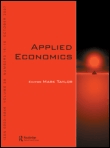
APPLIED ECONOMICS
Elevating Academic Discourse in EconomicsApplied Economics, published by Routledge Journals, Taylor & Francis Ltd, is a revered platform in the field of Economics and Econometrics. Since its inception in 1969, the journal has maintained its commitment to disseminating high-quality research, covering a wide range of topics within applied economics that are critical for understanding and addressing real-world economic issues. With a notable Q2 ranking in Economics and Econometrics and a strong standing in the 67th percentile of Scopus rankings, it serves as an essential resource for researchers, professionals, and students alike, providing insights that bridge theoretical frameworks and practical applications. While the journal is not an Open Access platform, it continues to foster academic discourse and innovation within the economics community, contributing to the ongoing development of evidence-based policies and practices. Its accessibility and robust editorial standards ensure that the latest findings and methodologies reach an engaged audience, further solidifying its reputation as a key publication in the field.
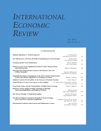
INTERNATIONAL ECONOMIC REVIEW
Pioneering insights that shape policy and practice.INTERNATIONAL ECONOMIC REVIEW is a prestigious journal dedicated to advancing knowledge in the fields of economics and econometrics. Published by Wiley in the United Kingdom, this journal boasts an impressive Q1 ranking in the 2023 category of Economics and Econometrics, reflecting its significant impact in the academic community. With a continued publication since its inception in 1979, it offers a platform for rigorous scholarly articles that address contemporary issues, theoretical developments, and empirical findings in economics. Although it does not currently offer open access options, the journal maintains broad accessibility through institutional subscriptions. Researchers, professionals, and students are encouraged to contribute to and engage with this leading publication to foster knowledge exchange and stimulate scholarly dialogue in economic research. With its commitment to high-quality scholarship, the INTERNATIONAL ECONOMIC REVIEW remains a vital resource for developing insights that inform both policy and practice.

Panoeconomicus
Shaping Insights in Economics, Econometrics, and FinancePanoeconomicus is a renowned academic journal published by SAVEZ EKONOMISTA VOJVODINE, specializing in the evolving fields of Economics, Econometrics, and Finance. Since its inception as an Open Access publication in 2006, this journal has fostered a collaborative environment for scholars and practitioners to disseminate research that contributes to critical economic discourses. Based in Serbia, and operating within an international context, Panoeconomicus carries an impressive Scopus Rank in the 57th percentile, further reflected in its Q3 category quartile for Economics, Econometrics, and Finance as of 2023. With a commitment to enhancing academic dialogue through readily accessible content, the journal is instrumental in shaping new insights and methodologies available to researchers, finance professionals, and students alike. Its significance in the field continues to grow, particularly as it addresses pressing economic challenges from 2009 to 2024 and beyond, making it a valuable resource for those aiming to stay at the forefront of economic research.
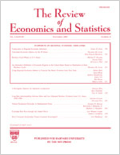
REVIEW OF ECONOMICS AND STATISTICS
Fostering innovation in economic research and analysis.REVIEW OF ECONOMICS AND STATISTICS, published by MIT PRESS, stands as a pivotal journal in the fields of economics and econometrics, with origins dating back to 1978. As a high-impact publication with impressive 2023 rankings placing it in the Q1 category for both Economics and Econometrics, and Social Sciences (miscellaneous), it serves as a crucial platform for scholarly discourse. With an E-ISSN of 1530-9142, the journal provides vital insights and analyses that drive contemporary understanding of economic phenomena. Recognized for its rigorous peer-review process and influential research, the REVIEW OF ECONOMICS AND STATISTICS is essential for researchers, professionals, and students aiming to advance their knowledge and contribute to the field. Though it does not currently offer open access, its substantial impact factor and cutting-edge studies ensure that its articles remain indispensable resources for anyone dedicated to the advancement of economic research.
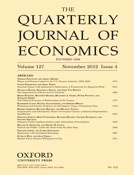
QUARTERLY JOURNAL OF ECONOMICS
Shaping Economic Policy Through Rigorous ResearchQUARTERLY JOURNAL OF ECONOMICS is a prestigious and long-established academic journal published by Oxford University Press Inc. With its origins dating back to 1886, this esteemed journal has continually provided a vital platform for the dissemination of cutting-edge research in the field of economics and econometrics. The journal holds an impressive Q1 ranking in the Economics and Econometrics category, positioning it at the forefront of scholarly contribution with a Scopus rank of #2 out of 716, reflecting its standing in the top 1% of the field. Although the journal is not open access, it offers a wealth of vital resources and insights that are indispensable for researchers, professionals, and students alike, as it aims to advance knowledge and influence economic policy and practice through rigorous academic inquiry.

ECONOMETRICA
Shaping the future of economic research.ECONOMETRICA, published by Wiley, is a leading journal in the field of economics and econometrics, renowned for its rigorous and cutting-edge research contributions. With an ISSN of 0012-9682 and an E-ISSN of 1468-0262, this esteemed journal holds a prestigious position in the academic landscape, classified in the top quartile (Q1) for both Economics and Econometrics as of 2023, and ranked 42 out of 716 in its field, placing it in the 94th percentile according to Scopus metrics. The journal's scope encompasses a diverse range of topics aimed at advancing economic theory and its practical applications, making it an essential resource for scholars, practitioners, and students alike. Although it operates under a subscription model, the depth and quality of research published in ECONOMETRICA underscore its significance as a cornerstone for intellectual discourse and innovation within the field. Based in the United Kingdom, at 111 River St, Hoboken, NJ 07030-5774, ECONOMETRICA continues to attract high-caliber contributions that shape the future of econometric research.

Review of Economic Analysis
Advancing Economic Understanding Through Rigorous AnalysisReview of Economic Analysis is a distinguished open-access journal published by DIGITAL INITIATIVES, UNIVERSITY OF WATERLOO, that has been committed to disseminating high-quality economic research since its inception in 2009. Renowned for its rigorous peer-review process, the journal provides a platform for innovative findings in the field of Economics and Econometrics. With an impact factor that underlines its relevance in academic circles, the journal continues to uphold scholarly excellence, currently classified in the Q3 category (2023) within the Economics and Econometrics domains, ranking #549 out of 716 in Scopus. The open-access model ensures that critical research is accessible globally, fostering collaboration and knowledge-sharing among researchers, professionals, and students. Interested contributors and readers can connect with the journal's vibrant academic community based in Waterloo, Canada, and explore a diverse array of articles that push the boundaries of economic analysis and understanding.